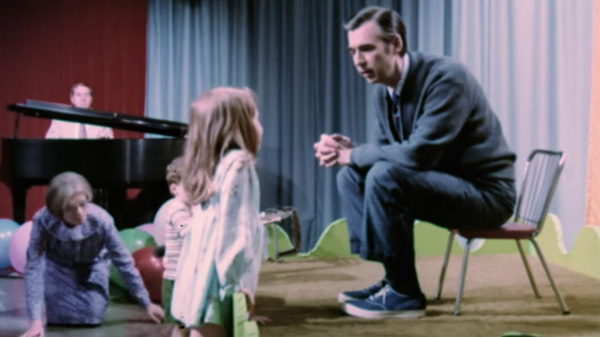
Josh Reviews Won’t You Be My Neighbor?
Perhaps the best movie I saw this past summer was Morgan Neville’s wonderful look at the life and work of Fred Rogers, Won’t You Be My Neighbor?
Like so many of my generation, I grew up watching Mr. Rogers’ Neighborhood. The moral and life lessons of Fred Rogers’ television program for children have stayed with me, and are deeply woven into my being. I knew this, but watching Won’t You Be My Neighbor? I was struck anew by the lessons that Mr. Rogers taught me and so many other kids like me.
The documentary film is a heartwarming (and also, at times, sad) look back at Mr. Rogers’ life and his life’s work: using the medium of television to educate children. The film allows us to hear from Fred Rogers himself, via archival footage (such as clips from his famous testimony before Congress in 1969) and generous helpings of scenes from the show. Even better, the film brings together many of the men and women who knew and worked with Mr. Rogers. We hear from many of the men and women who knew and worked with him, in front of and behind the camera, and they each have fascinating and insightful stories to tell.
Watching the film, I was struck by the power of Mr. Rogers’ moral teachings. The film devotes significant time to lessons that Mr. Rogers wove into his TV show. For example, the film spends time discussing the episode in which Fred Rogers invited African-American François Clemmons, who played a friendly neighborhood police officer on the show, to wash his feet in the same small pool that he (Mr. Rogers) was using. (That clip from the show is presented, in the film, along with actual clips of African Americans being chased out of a whites-only swimming pool. It’s a powerful reminder of just how bold Mr. Rogers’ show truly was at the time.)
I particularly enjoyed the attention the film gives to an analysis of Fred Rogers’ pedagogical approach to education. Most often this is explained best by Mr. Rogers himself, in archival interview footage. I found it fascinating to listen to him discuss the ways he used his show to help teach kids to feel comfortable with their full spectrum of feelings, from happiness to sadness to anger. One moment that stuck with me is when he compares talking to kids about their feelings with playing the piano — some key changes are easy, while some are hard. I found this to be a striking piece of insight, one of many in the film.
But the film does not set out to canonize Fred Rogers as a perfect saint. In an uncomfortable moment, one of his sons comments on the difficulties of having “the second Christ” as a dad. And the film doesn’t shy away from the fact that the same man who boldly washed his feet in the same pool as François Clemmons also discouraged the gay Mr. Clemmons from coming out of the closet. (Later in life, Fred Rogers did become a supporter of gay rights.)
This isn’t a cynical film designed to knock Fred Rogers down. The film doesn’t buy into the position of those modern-day talking heads who have criticized Mr. Rogers for teaching kids that they’re each special. (A few choice clips of that sort of idiocy appear towards the end of the film, with the film itself serving as a potent counter-argument.) But I appreciated that the film was able to present a picture of Mr. Rogers as a human being.
I commented above that Won’t You Be My Neighbor? was both heartwarming and also sad. Watching the film, I felt a profound sense that something important had been lost from our culture with the passing of Fred Rogers and his children’s television program. Our world needs more teachers and leaders out there focusing on the values of kindness, of understanding, of love. I find it hard to shake my sadness at the Fred Rogers shaped hole that now exists in the world, and I worry for the generations of kids growing up without the benefit of his wisdom.
But I don’t think Mr. Rogers would want me to focus too intently on the negative. Won’t You Be My Neighbor? is a wonderful piece of work that shines a well-deserved light on a man who worked so hard to bring good into the world, and who taught so much to so many of us.
